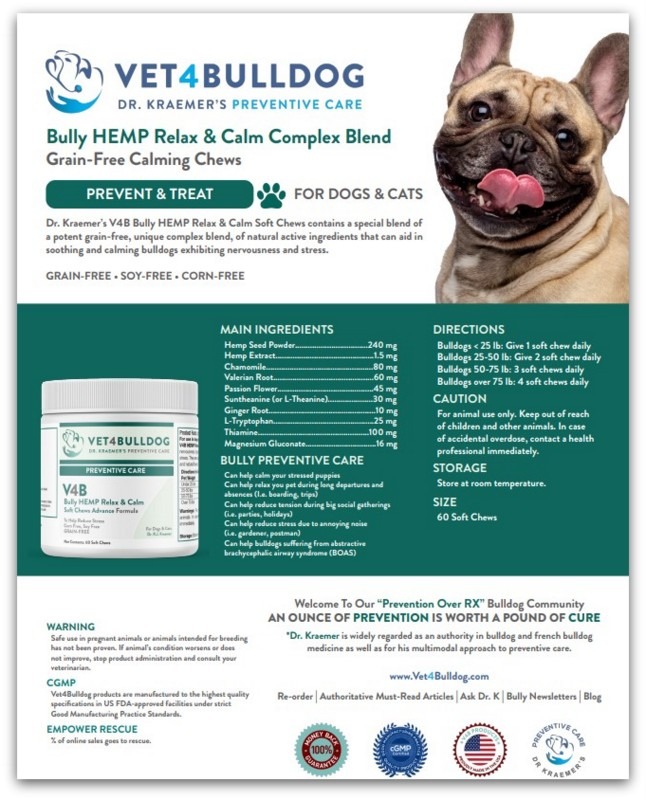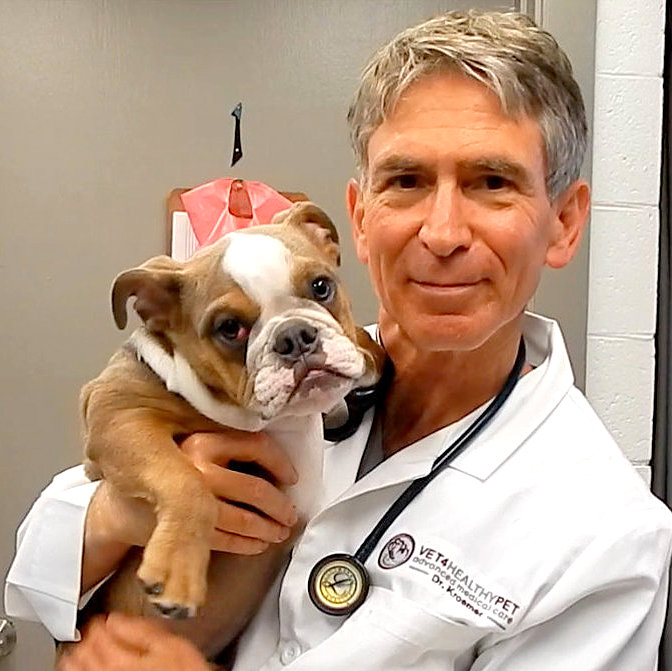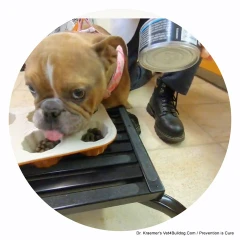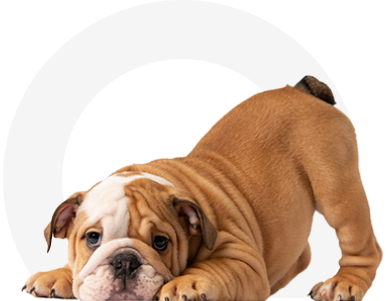Much like us, bulldogs often face issues with being overweight, mainly because they consume more calories than they use. In simpler terms, they’re eating more and moving less.
Understanding the complex and varied factors behind bulldog obesity is critical. These can include lifestyle choices, diet, genetic factors, and existing health issues, underscoring the importance of adopting an all-encompassing approach to weight management.

Obesity, Overweight, in Bulldogs and French Bulldogs / CAUSE:
Obesity in bulldogs typically arises from several factors:
- EXERCISE: A lack of sufficient physical activity
- FOOD: excessive calories
- Diets rich in calories
- Loving owners who unknowingly overfeed their pets
- Unintentional overfeeding by various household members
- Fatty calorically reach treats
- ANXIETY & STRESS: anxiety and emotional stressors lead to overeating. examples are:
- boredom
- uncertainty from irregular feeding schedules
- anxiety caused by multiple pets competing for food
- Unintentional overfeeding by various household members, losing track of the pet’s total calorie intake.
- GENES: Genetic factors and individual metabolic rates mean each pet’s diet and feeding schedule may need personalization.
- GUT DYSBIOSIS: Dysbiosis is a term used to describe an imbalance in the gut microbiome. When dysbiosis occurs, there is an overgrowth of harmful bacteria and a decrease in beneficial bacteria. This imbalance can lead to a variety of health problems, including obesity, diabetes, inflammatory bowel disease, and allergies.
Bulldog and French Bulldog Obesity / HEALTH COMPLICATIONS:
Obesity can exacerbate many common breed-specific health issues in bulldogs, including:
- Arthritis and other orthopedic issues like
- ACL injuries
- medial patellar luxation
- Hip Dysplasia
- Elbow Dysplasia
- Intervertebral disc disease and other spinal problems.
- Brachycephalic obstructive airway syndrome (BOAS) and related respiratory difficulties.
- Complications with skinfold dermatitis.
- Increased risk of heart disease
- Hypertension (high blood pressure)
- Metabolic diseases, including
- fatty liver disease
- diabetes
- Chronic inflammation and immune-mediated diseases
- Kidney disease
- Cancers
- Gut dysbiosis: There are a few possible ways that obesity may affect the gut microbiome:
- Diet: Obese pets are more likely to be fed a diet that is high in fat and sugar. This type of diet can promote the growth of harmful bacteria.
- Inflammation: Obesity is associated with chronic, low-grade inflammation. This inflammation can damage the gut lining and make it easier for harmful bacteria to invade.
- Antibiotics: Obese pets may be more likely to be prescribed antibiotics. Antibiotics can kill both harmful and beneficial bacteria, which can disrupt the balance of the gut microbiome.
Overall, obesity significantly diminishes life quality and expectancy
Obesity, Overweight, in Bulldogs and French Bulldogs / TESTS
- Body Score
- Weight
- Exam
- Lab: Blood and urine, at times including additional metabolic tests like thyroid and adrenal tests

Obesity, Overweight, in Bulldogs and French Bulldogs / PREVENTION:
To manage and prevent obesity, consider the following strategies:
- FIBER: Increase fiber consumption for better satiety
- DIET: Follow a low-calorie, low-fat diet rich in fiber.
- Prescription weight-loss Diets
- FEEDING: Family and Household Involvement, A commitment of all household members to the pet’s weight management plan is crucial for consistency and preventing accidental overfeeding.
- EXERCISE: Implement gradual increases in physical activity and play.
- ANTI-ANXIETY: Address and reduce anxiety and stress.
- V4B Bully StressLess Formula
- V4B HEMP Relax & Calm

- PLAY: Engage your pet in various stimulating and playful activities to prevent boredom.
- TREATS: less and low-fat organic ones like vegetables and fruit like baby carrots, cucumbers, and green beans.
- GUT MICROBIOME:
SPAY & NEUTER / WEIGHT MANAGEMENT:
Consider the effects of spaying or neutering on your pet’s caloric needs and lifestyle, ensuring the plan is safe, effective, and sustainable.
WEIGHT MANAGEMENT FOR MATURE BULLDOGS
Recognize that mature dogs have different dietary requirements and generally need fewer calories than puppies.

WEIGHT MANAGEMENT AND VETERINARY CARE
Be aware of medical conditions that may contribute to obesity, such as thyroid and adrenal diseases. Have your veterinarian help determine your bulldog’s current Body Condition Score (BCS) and ideal weight, select an appropriate target weight, and help you understand the caloric content of your pet’s food and treats.

Bulldog and French Bulldog Obesity and Weight Management SUMMARY
Commit to monitoring your bulldog daily
- Caloric intake
- Food type
- Feeding schedule
- Portion control
- Fewer treats
Recommended by Owners Approved by Bulldogs


















